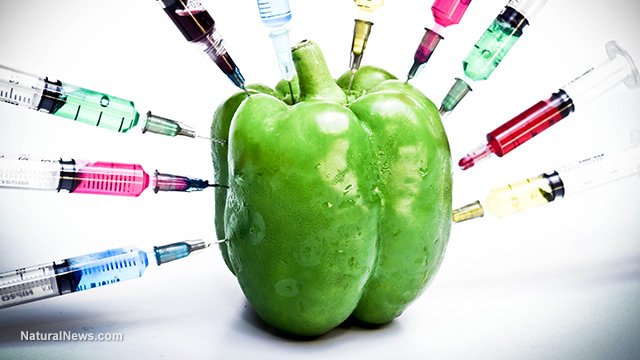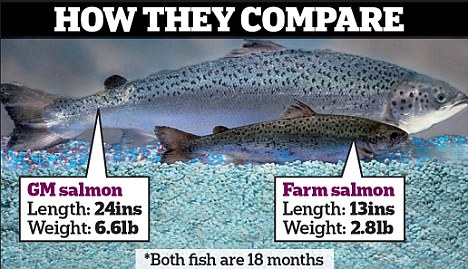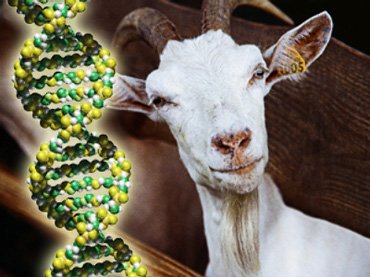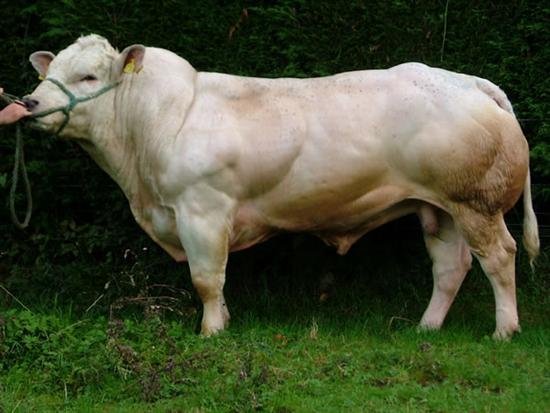
There's been a lot of outcry as the FDA just approved a genetically modified animal for human consumption for the first time. Sure, tweak 80 percent of U.S. food, but keep your test tubes off our salmon! organisms GMO's incite heat on both sides. Many believe genetically modified organisms are more efficient than cross-breeding plants for many generations and crossing fingers; while detractors believe we shouldn't genetically modify the food we eat and should keep it "natural." I use finger quotes not to make fun, but because what "natural" means in this context is confusing for many, if not most people, even the FDA get's confused about it! Now, joining the list of tomatoes, potatoes, soy/tofu, rice, cotton, corn (so much corn), canola oil, squash, alfalfa, and mosquitoes, is GM salmon.

According to AquAdvantage, the company that modified the fish, the salmon contains genes from "Chinook salmon and an eel-like species," which means it will grow all year, and at a faster rate than natural salmon. It will, of course, need to eat more food to grow at such a rate, but will only live in fish farms so won't be competing with natural varieties. According to the FDA, "there are no biologically relevant differences in the nutritional profile of AquAdvantage Salmon compared to that of other farm-raised Atlantic salmon." And now that they've been approved for human consumption, they'll swim their way onto some store shelves and on top of our bagels.

This has, unsurprisingly, caused a huge outcry from anti-GMO activists. Some stores are even refusing to sell the genetically modified fishes. According to pretty much every scientific group or organization on the planet, GM organisms are completely 100 percent safe for humans. There are more than 600 studies on it, all saying GMOs are safe. And yet, people are still nervous, and I get why, you're messing with my food man! Most GM grains sold in the US are used for animal feed.

According to Consumer Reports, pretty much every human food sample they tested contained GMOs, except those which explicitly said otherwise; that included cereals, baby formula, veggie burgers, and popular chip brands. GMOs were found in products labeled "organic" and "natural" because those labels don't mean anything and aren't regulated. According to the FDA this salmon, dubbed a "frankenfish" by the activist groups, is safe to eat, and will allegedly pose no threat to the environment. The FDA approval requires the salmon to live only in fish farms, but even if one did escape, 95 percent of the fish are sterile. Cross your fingers any escapee isn't one of the five percent. Some GM grains like canola have been created which don't reproduce at all; like Jurassic Park's "Lysine Contingency" the GMOs can't live in the wild without the "special sauce" the lab uses to grow them. But c'mon you guys, shouldn't that have been step 1? Not an afterthought. We already have GM plants growing in nature all over the U.S., and no one knows what's going to happen there. This isn't the only GMO animal in the research and approval pipeline.

A line of goats was created whose milk can prevent deadly diarrhea in children, the company is marketing it to the government of Brazil, where children still die from diarrhea. A species of chicken was modified which suppresses the replication of bird flu virus, and pigs are also being bred that are resistant to swine flu! All this sounds pretty good, but, it seems to me, people get increasingly uncomfortable as the animals come closer to their tables... In a partnership between Harvard Medical, University of Missouri and the University of Pittsburgh a GM pig was created which produces higher omega-3 fatty acids. Omega-3s are essential for health, but are not synthesized by mammals. Instead, they're found in microorganisms, algae, plankton and worms; fish get their omega-3s from algae too! By modifying a worm enzyme for a pig species, this pig is now a source of omega-3s!

There are plans to modify cattle to stop them growing sharp horns which can be dangerous for farmhands and other cows, and mix various traits from different cow species to produce more milk, more beef or whatever is required. GM meat is here. It's right. Here. Supporters and company representatives say as the population continues to increase exponentially, humanity needs food sources that have a lesser impacts on the environment. Transgenic animals -- those with genes from other species -- had yet to be rated as "safe for human consumption" until now. But, according to allllllll the science that's fit to print, GMOs are safe, and this fish is heading out, but how do you feel about them? Are you concerned about GMOs? Would you buy a GMO salmon? GMOs are everywhere now, but people still have a misunderstanding of what they are.
If you enjoyed, Resteem and Follow me @masonmiler for more content just like this, and as always, take care of yourselves, and take care of each other :)
Your post has been chosen by the @robinhoodwhale initiative as one of our top picks today.
Learn more about the Robinhood Whale here!
The Steemit community looks forward to more great stuff from you. So, please keep on Steeming!
Good luck!
~RHW~
Thanks robinhood for choosing my post.
Yes, I think GMOs are safe to eat and will be a huge benefit to the growing human population of our planet.
I have absolutely no problem eating a modified plant or animal product.
I think you've correctly identified why people distrust GMOs, it's a new technology. However, long term studies have been done, and as you've put in your post, determined to be as safe as 'non-GMO' foods.
The thing is GMO means: genetically modified organism, it says nothing of how that modification was achieved. Everything we eat has been modified by humans.
Ever seen a 100% unmodified banana?
Good luck eating that tiny, seed stuffed, thing.
Up until now, it's been the shot-gun approach to modification of cross-breeding and selection, which is NOT inherently safer, it is inherently less efficient.
GMO rice can save millions of children from vitamin A deficiency, which leads to blindness, GMO maize can grow in harsher conditions, GMO cassava is resistant to famine causing disease!
These products primarily benefit the poor. The activists who speak out against them can afford to buy "organic" "natural" products, and vitamin supplements (if they want expensive urine); they sow mistrust and misinformation because they can afford to, because they don't understand how trans-genetic technology works and are scared.
One final note: that cow you've featured is a Belgian Blue, a result of traditional breeding, and not a trans-genetic GMO cow.
Sources:
Banana
Belgian Blue
Golden Rice
GM Maize
If anyone has a problem with using wikipedia as a source, just follow the source links contained in those pages.
Perfectly explained about gmo but the bull is also a gmo. Belgian Blue is a good species of meat that's why scientists choosed this breed for gmo.
http://www.adguk-blog.com/2013/08/monstrous-gmo-bulls-now-reality.html
Yes, it's a GMO in the same way that all cattle are GMOs; traditional breeding and selecting is a form of genetic manipulation, however it is not a trans-genic GMO it's been produced the same way all other breeds of cattle have been. It is good for meat, though with all of that extra muscle perhaps not as good for the cow part of its existence. A bit like pure-bred dogs and cats with all of their warped bodies and genetic (hereditary) problems.
This post has been linked to from another place on Steem.
Learn more about and upvote to support linkback bot v0.5. Flag this comment if you don't want the bot to continue posting linkbacks for your posts.
Built by @ontofractal
I wished we gonna be super-heroes if we eat this lab created crap like in the comics.
Yes one day will come when i eat divine fruit and become a superhero. But i think it's possible if we find a way to transplant animal cells in human body.
This post has been ranked within the top 25 most undervalued posts in the second half of Dec 03. We estimate that this post is undervalued by $13.48 as compared to a scenario in which every voter had an equal say.
See the full rankings and details in The Daily Tribune: Dec 03 - Part II. You can also read about some of our methodology, data analysis and technical details in our initial post.
If you are the author and would prefer not to receive these comments, simply reply "Stop" to this comment.
Thanks @screenname for featuring my post in your blog. Upvoted and resteemed.
It depends. Why does everyone speak so generally about GMO, gene editing or whatever they are calling it now? What are they editing? Is it to make the plant resist pesticides, herbicides, pests (built in pesticide), poor ph soil, all of these or what? Also, why is the nutritional value never quantified in any of these test results? I'm not referring to the standard nutrients either, lets get a full spectrum analysis including fulvic/humic acids, trace elements and minerals to start. I see nothing more than profit motivated modifications behind these and do not support a large majority.
yes you are right i think more study on gmo is needed.
Indeed. Somebody needs to because the FDA isn't doing any testing...
However, FDA does not itself test whether genetically engineered foods are safe. The FDA has repeatedly made this clear. As Jason Dietz, a policy analyst at FDA explains about genetically engineered food: “It’s the manufacturer’s responsibility to insure that the product is safe.”[2] Or, as FDA spokesperson Theresa Eisenman said, “it is the manufacturer’s responsibility to ensure that the [GMO] food products it offers for sale are safe…”[3]
Nor does the FDA require independent pre-market safety testing for genetically engineered food. As a matter of practice, the agrichemical companies submit their own studies to the FDA as part of a voluntary “consultation.” Moreover, the FDA does not require the companies to submit full and complete information about these studies. Rather, as the FDA has testified, “After the studies are completed, a summary of the data and information on the safety and nutritional assessment are provided to the FDA for review.”[4]
https://usrtk.org/the-fda-does-not-test-whether-gmos-are-safe/
Given the prevelance of white-washing science that has been contaminated by corporate greed and hubris....I don't believe a word of it. They haven't got a frikin clue how all this rearranged genetic material will react of the long-term in the wild because the science simply hasn't been done. How do they know what is causing the ill health of Americans...one of the most GMO contaminated continents in the world? In years to come, we'all find out just how rediculous their sudo-science was and we'all all be living with the consequences. Perhaps all the bought off scientists and politicaians who sold everyone out with their live experimentations on innocent people will be dead and gone by then so we can just add this abuse to the latest calamity future generations will have to deal with on our behalf.
I couldn't have said it any better, @benjojo.
Agreed! They put some GMO pear trees up in our subdivision because they grew quickly making the new properties look good. The developer loved them because the houses sold quickly given great curb appeal. They didn't account for the long term impact of over growth and disastrous issues with splitting during high winds, snow or ice. These trees are now banned from being sold.
In the human body accumulation of toxins from GMO over sprayed products builds up over time and shows itself with varied symptoms we label diseases - I believe. It's terrible to see and unfortunately the industry prevents us from tracking this information on labels so we are unable to quantify the results unless one drastically changes their lifestyle.
That is just more incentive to plant and cultivate our own fruits and vegetables, and produce our own meat or buy it from a local who raises it by ethical, traditional means. @papa-pepper is doing just that and has several posts about it.
Indeed - need to unplug and get to work!
I would love to homestead and provide for my family by my own means. If only I could get rid of this pesky debt plaguing me I would be able to. If that is what God wants for me, it will happen in time!
That's interesting. Do you know what the name of the pear was? Do you know what the non-pear organism was that was transferred into the pear? Where was this? Thanks.
How could I forget... Bradford Pear Below is the first link that popped up in google. Not sure on the organism but saw mention of one in here.
http://www.greenvilleonline.com/story/life/2016/03/21/curse-bradford-pear/82070210/
So a Bradford Pear is not a GMO plant, though. So that's what I'm confused about. The Bradford Pear is a mess of a plant, that's for sure. It stinks bad when it flowers, it wasn't supposed to fruit but it does, and now it is spreading like a weed. The one good thing is that people can graft other pears to it. But they aren't a GMO.
jag vet ingen av teda
Sorry buddy but can you write this in english because i don't know this language
The genetic modification is a technology. Whether the use of that technology is warranted, I think, depends on what is being combined. I would advocate using GM engineering to eliminate some invasive pests, like the spotted wing drosophila. A 5-year GMO effort would be worthwhile. But I would be skeptical of proposals to genetically modify plants to produce pharmaceuticals, like spermicide or insulin in rice.
I am OK with vitamin A being increased in rice, if there's testing that any changes in proteins or other constituents of the rice will not creating problems. For example, shellfish proteins cause many allergies. I would take a precautionary approach to those proteins being introduced into rice, without open, transparent, and peer-reviewed testing.
So the key for me is open, transparent, and responsive testing. New varieties of potatoes are tested to be sure they aren't producing too much solanine - and varieties have been taken off the market for that reason. GMOs should be treated no differently.